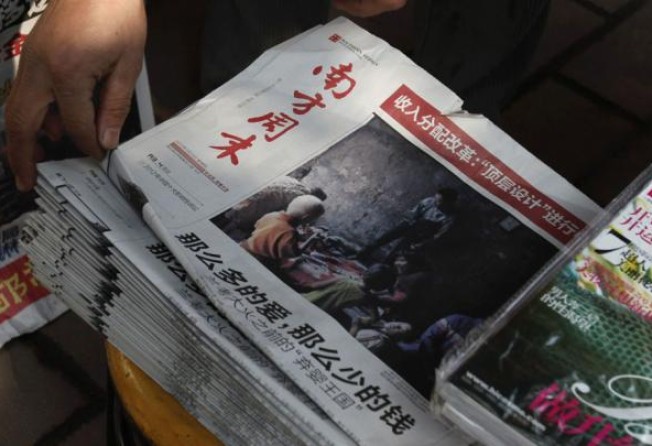Southern Weekly agrees to autonomy deal, says censor

Guangzhou's outspoken Southern Weekly has regained some of its editorial autonomy, according to a censor at the newspaper.
Zeng Li, writing in his blog, said authorities had agreed that assignment ideas and drafts would no longer require approval from the provincial propaganda department before publication.
"The newspaper's editorial board is drafting a report to claim back the authority in making editorial decisions and make the publishing process more systematic, and the request has won support from senior cadres of Nanfang Media Group [which owns the weekly]," he wrote in the first open comment from an insider at the paper since the end of the row between editorial staff and propaganda officials this month.
Editorial staff refused to talk about the deal yesterday, but some showed their support for Zeng's article on the internet.
Zeng, who was hired by the newspaper as an in-house censor after retiring from the group, also gave some rare details of how media control was tightened until it reached breaking point early this month over the paper's New Year edition.
Partly defending the internal censorship, Zeng said he was assigned to help the paper dodge political risks, rather than to "strangle freedom of speech".
For instance, he warned editorial staff to be cautious about the "singing red songs, striking the black" campaign promoted by disgraced former Chongqing party chief Bo Xilai .
With the campaign still gaining national popularity about two years ago, Zeng told editorial staff they should stay alert and watch from the sidelines because he sensed that singing red songs was harking back to the Cultural Revolution. He said he faced stiff resistance from reporters at times, but was touched by their boldness and professionalism.
Without mentioning Tuo Zhen by name, Zeng said the appointment of a new Guangdong propaganda chief in May, combined with a sensitive political environment after the fall of Bo and the change of leadership at November's party congress had seen censorship at the paper go from bad to worse.
Those incidents had led to a final eruption when provincial propaganda authorities intervened in the New Year edition, with some journalists staging a short-lived strike.
Zeng said editorial staff had not expected such a strong public response to the dispute, which included a protest by several hundred people in Guangzhou demanding freedom of speech.